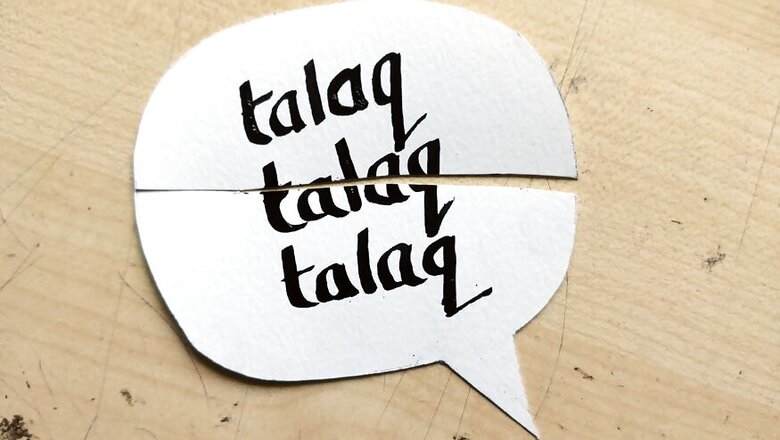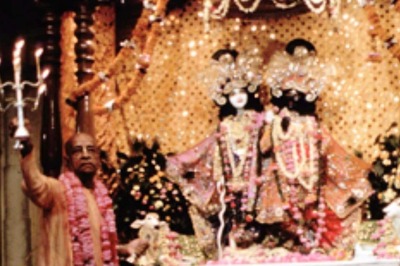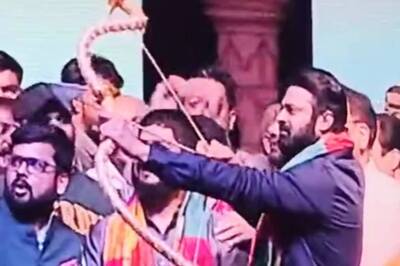
views
“The parties should either hold together on equitable terms or separate with kindness”
(Quran: 2:229 Surah al-Baqarah).
A recent judgment by the Supreme Court where it struck down instant Triple Talaq as ‘unconstitutional’ has now been followed up by the government with a newly passed Muslim Women (Protection of Rights on Marriage) Bill, 2017. Union Law Minister Ravi Shankar Prasad’s reasoning justifying the government’s action that instant triple talaq or talaq-e-biddat – the practice by which Muslim men divorce their wives by saying the word talaq three times in one sitting which Supreme Court’s order had set aside in August, has not worked as a deterrent.
He further added, “it is, therefore, felt that there is a need for State action to give effect to the order of the Supreme Court”. Union Law Minister failed to cite any data or facts to support his claim by which it was concluded that Supreme Court’s order has not worked during this period from August to December 2017.
The intervention by the State through this Bill placed before Parliament mainly states and declares instant triple talaq as void (SC’s judgment had already done that) and imposes a criminal penalty on the husband for pronouncing it in one sitting (three years imprisonment and fine).
The Supreme Court judgment while declaring instant triple talaq as unconstitutional, had cited laws from 19 countries (Indonesia, Malaysia, Egypt, Pakistan, Bangladesh, Sri Lanka among them) that have abolished the practice, seen as an unfavourable form of divorce in Islam. The instant Triple Talaq judgment was mostly welcomed as a measure of rectifying an extremely cruel and anti-women practice which finds no mention in the Quran.
ISLAMIC LAW
A marriage is purely a contract under the Islamic law (unlike Hindu/Christian laws). Islamic law was much more progressive for its time made a provision for termination of marriage where both husband and wife could dissolve it. It was an undesirable act, therefore had an elaborate process where reconciliation, arbitration from both sides were encouraged.
When a divorce is initiated by the husband over three sittings, it is known as Talaq (Arabic for freeing or undoing the knot).
Pronouncement can be verbal or written, and should only be done once in the presence of two witnesses. If the wife initiates a divorce it is known as khul'a. In any Islamic divorce procedure, there is a three-month waiting period, where reconciliation also exists as an option before the divorce is finalised.
Husband is supposed to pay maintenance and alimony to the wife once the divorce is settled.
Instant Triple Talaq is pronouncing divorce in one sitting which has no validation from the Quran. Prophet in one of Hadith mentions instant triple talaq in one sitting to be considered with an effect of one divorce and hence, a possibility of reconciliation.
Instant divorce provision came to be used in Caliph Umar’s reign when he thought that elaborate process was getting distorted and people were taking divorce non-seriously. Instant Divorces increasingly started getting pronounced through a letter, phone call or sometimes even through text message, WhatsApp or Skype and we witnessed instant Talaq’s misuse in our era. Although there is lack of data on women affected by instant Triple Talaq, as a practice, it needed to be done away with.
GENDER EQUALITY AND JUSTICE
Men following arbitrary practices to abandon their wives is something seen across religions. Abandoned women outnumber divorced women at 23.7 lakh (among women abandoned without divorce, 80 per cent are Hindus and 12 per cent are Muslims, according to Census, 2011).
Abandoning women provides an easy escape from the lengthy legal process and also the requirement for the husband to pay suitable alimony and compensation to his wife can be avoided as well.
Personal laws draw sustenance from religion. There are many provisions of Hindu law, Muslim law, Christian law or Parsi law which can be seen as anti-women in modern times. Women empowerment as an issue has multiple concerns that need to be redressed.
CONCERNS AND POLITICS
BJP government led by Prime Minister Narendra Modi has made strong claims that Muslim women in their fight against instant triple talaq have support from his administration. Since the Bill concerns interests of most Muslim women, it would be interesting to know if any of them were part of the drafting committee.
Muslim bodies like AIMPLB (All India Muslim Personal Law Board), AIMIM (All India Majlis-e-Ittahidul Muslimeen of Owaisi) and Bebaak Collective (Women’s group which had supported Shayara Bano's petition against Triple Talaq in the Supreme Court) have opposed the Bill.
Stakeholders were not consulted before bringing in such an important legislation as consultations with the community which it concerns have been close to none.
Criminalization of instant Triple Talaq as cognizable and non-bailable offence means not just the wife but anybody can make a complaint and police can arrest or investigate a Muslim man, leaving ample scope for harassment. Instant Triple Talaq itself has been outlawed, so the wife is still married and if the husband goes to jail, maintenance of family will be an issue.
Also, a pronouncement of Talaq thrice in one sitting would need admissible evidence in the court for the husband to be convicted, meaning more work for our over-burdened police and judiciary. Present Bill’s overreach in making a criminal offence of a civil act has been severely condemned.
Under the watch of the present government wherein, the name of Gau-Raksha and other flimsy reasons Muslims have been lynched with impunity and killers have enjoyed political patronage, support for rights’ of Muslim women seems quite superfluous.
Women, Muslims and others need the support of the government for them to move ahead in society but this support at the cost of their husbands going to jail may just complicate conjugal matters even more for Muslim women.
(Author is a PhD in Sociology and a freelance researcher. She is currently teaching at Jamia Millia Islamia. Views are personal.)




















Comments
0 comment